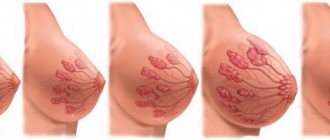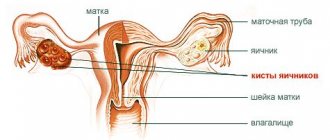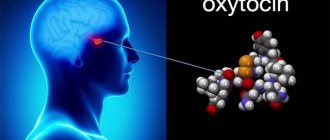Women's breasts are extremely susceptible to the slightest changes in the body that occur due to hormonal fluctuations. Pregnancy is a condition when the breasts respond to the slightest hormonal changes with pain and act as an excellent indicator for women.
The mammary glands undergo changes from the first month of pregnancy. They become larger, sensitivity increases, and the areolas around the nipples darken. A progressively increasing level of hormones leads to pain and enlargement of the mammary gland. She is being prepared for lactation. The cause of discomfort is the growth of glandular tissue responsible for milk production.
The course of pregnancy always depends on the characteristics of the woman and her health. When your chest stops hurting, you need to find out the reason. There is probably no reason to worry or worry. This is not a pathology when some women do not have breast pain during pregnancy. Each case is different from the others; only a doctor can determine the condition of the woman and child.
Stopping pain as a signal of approaching labor
The mammary gland is actually a detector of normality and pathology at the time of bearing a child. The changes that occur in the female body at the time of bearing a baby (throughout pregnancy) indicate pathology and normality.
So, in some situations it is worth worrying, since absent pain indicates a lack of hormone, which in itself is dangerous. In others, the situation of soreness indicates normality.
At the beginning of the period, approximately in the period of 5-12 weeks, the woman’s bust hurts very much, literally any touch is painful, sleep is also light because of this. But such a manifestation is a sign that everything is happening normally, hormones are being released, pregnancy is developing.
If your breasts stop hurting in recent weeks, but the swelling remains, this may indicate the onset of labor. The first symptoms of labor will soon be noted:
- prolapse of the abdomen;
- aching vague pain in the back;
- spasmodic or cramping increasing painful manifestations in the uterus.
Important
During the entire pregnancy, yellow secretions and transparent and pink liquid should not be released from the nipples.
When the cessation of pain is an alarming symptom
At what time does the breast stop hurting, and does such a symptom indicate pathology, a risk for further development of pregnancy? If in the early stages (up to about 14 weeks) the chest pain suddenly stops in one day, then you should seek help from a doctor.
Alarming manifestations of the anomaly are additional symptomatic manifestations:
- vaginal discharge of any color except clear mucus;
- pain in the abdomen, back;
- no nausea;
- the reaction to the sensitivity of odors decreases.
In this case, you need to take additional tests to determine the amount of hCG in the blood, and also undergo an ultrasound examination prescribed by a gynecologist. All pathologies or risk of placental abruption due to hormonal deficiency will be visible.
What to do if your chest stops hurting?
We found out the reasons for painful sensitivity of the breasts during pregnancy and that this phenomenon is completely normal for a woman in this position. It would be logical to ask the question: if the breasts stop hurting during pregnancy, is this not an alarming signal?
First of all, it should be noted that the period of gestation proceeds differently for everyone. Even for the same woman, each new pregnancy can cause completely opposite feelings. Did your breasts stop hurting in early pregnancy? This is not a reason for immediate panic; perhaps this is an individual characteristic of your body, for example, your body is simply accustomed to new changes.
You should also keep in mind that pain can be periodic, and this is due to hormonal fluctuations. It is completely normal to have no pain after 10-12 weeks of gestation. During this period, the placenta, which has already fully formed, is included in the work of maintaining pregnancy. As a result, the level of the pregnancy hormone progesterone decreases significantly, up to the complete cessation of its synthesis. In this case, nothing threatens the pregnancy and the embryo develops normally.
During this period, the body and its functions fully adapt to the needs of the child. As a rule, these changes are reflected in a woman’s condition as follows:
- Digestive problems may occur: heartburn, constipation, vomiting;
- weight loss;
- breasts begin to stretch and swell;
- the need for folic acid is extremely high.
If at 6 weeks of pregnancy your breasts stop hurting, and the above explanations seem too simple to you, then it’s better to visit a gynecologist. In addition, it is time for a thorough examination, including a pregnancy test. The gynecologist will take blood for analysis. If there is a negative Rh factor, the doctor will prescribe treatment. In addition, weighing is carried out and urine is examined.
Frozen pregnancy
Freezing in the development of an embryo or fetus is most often observed in the early stages, but the risk of developing an anomaly remains at a later stage. As a rule, the cause of such a terrible situation is an insufficient supply of hormones. The uterus does not receive the required amount of hormones, insufficient nutrition and provision for the baby occurs, and the fetus freezes.
The risk of freezing up to the 15th week remains in 15% of pregnant women, then this percentage is reduced by half. The cause of pathology at such periods is genetic damage. In the last stages of a baby’s development, freezing occurs in 2% of cases; as a rule, the cause of this condition is the formation of a blood clot or infection, since imperfect genetics is already excluded.
Risk of miscarriage
With the development of a pathological condition, which occurs more often in the early weeks, a decrease in breast sensitivity is observed. In this case, as a rule, the beginning of red or brown discharge is recorded in parallel. The abdomen may not hurt, and no additional symptoms other than the absence of chest pain are observed.
The threat of miscarriage can be treated if detected in a timely manner. In particular, if the cause of such an anomaly is a lack of hormones, then a course of hormonal medications is prescribed, which allows you to preserve the fetus until the desired and safe term.
If the cause of the miscarriage is genetic abnormalities in development, then it is not recommended to continue the pregnancy. The baby may freeze at a later stage, which is already dangerous for the woman herself. To diagnose genetic mutations, studies of amniotic fluid and maternal blood are used.
Diagnostics
In order not to miss obstetric pathology, the doctor conducts additional studies. It is possible to say why the breasts stopped hurting during pregnancy only after a comprehensive diagnosis, which includes:
- Blood biochemistry: hormonal spectrum (follitropin, lutropin, prolactin, estrogens, progesterone).
- Ultrasound of the uterus and ovaries.
- X-ray of the sella turcica.
- Tomography.
Based on the results of the study, it is possible to confirm the physiological nature of the changes or establish pathology. But even if the latter option is diagnosed, the doctor will prescribe treatment that minimizes the possible risk to the woman and fetus.
Pituitary insufficiency
During pregnancy, the pituitary gland in women is responsible for sufficient production of the hormone progesterone, which helps maintain pregnancy. For a woman before fertilization, violations entail:
- infertility (sterility);
- disturbance of the menstrual phase;
- promotes the development of amenorrhea (complete absence of menstruation for at least six months);
- disappearance of sexual desire.
During pregnancy, such hormonal deficiencies are extremely dangerous. If there are disorders in the pituitary gland, a dangerous condition for a pregnant woman occurs - miscarriage, a stop in the development of the embryo.
Important
If, against the background of decreased pain in the mammary glands, there is general fatigue, lack of sexual desire and dryness of the labia (no clear discharge), this is a reason to immediately consult a doctor.
Why does breast pain occur during pregnancy?
While carrying a baby, your breasts change dramatically, especially if this is your first pregnancy. Changes in it occur because the woman’s body begins to prepare for breastfeeding. First of all, the breasts increase slightly and become fuller. From time to time, a slight tingling sensation appears, and the veins of the chest are more pronounced. Add to this the dark color of the areolas and enlarged nipples.
The so-called Montgomery glands are formed, which secrete an oily substance that helps soften the nipples during breastfeeding and allows them to withstand high stress. All these symptoms are the result of hormonal changes in a pregnant woman.
Because of these changes, many women complain of breast soreness. By the end of pregnancy, each breast weighs about 0.5 kg, and the skin cannot always withstand such a rate of growth of the load, so stretch marks appear on it, which disappear after the birth of the child.
When to see a doctor
During pregnancy, breast size should not decrease. During normal pregnancy, a gradual decrease in pain may be observed. However, nipples always remain extremely sensitive to temperature changes and hard clothing.
If, against the background of a sharp cessation of pain, there is also a decrease in size, and the symptoms are active, this is a reason to seek help from a doctor. Initially, the gynecologist who is managing the pregnancy will refer you for an ultrasound and blood tests to determine sex hormones. If alarming symptoms are detected, hospitalization and round-the-clock monitoring are recommended.
Also, do not ignore the following symptomatic manifestations:
- Chest pain has a point-like character. With the normal development of pregnancy, the breasts are swollen all over, it hurts not in a certain place, but everywhere. If a pregnant woman notices a certain pain in a specific place, you need to consult first with an obstetrician, and then with a mammologist.
- There will be no discharge from the nipples in the early stages. In later periods, discharge appears (not always) in the form of white droplets from the nipples. Colostrum appears, which is considered normal. If the discharge from the nipples has an increased volume, is greenish or yellow, then this is a reason for consultation.
- Primipara women have different breasts from those who have previously been pregnant. Thus, during repeated pregnancies, lumps appear in the breasts, which are necessary for the accumulation of milk. However, if a woman notices a certain lump that is located under the armpit, in the breast itself or near the chest, this is a reason to seek help.
Important
The most dangerous formations do not move. When palpating, you should pay attention to the movements of the ball: if it moves from side to side, it is not dangerous, but if the ball is hard and immovable, there is a risk of developing oncology.
Week 9 Features
Having reached the 9th week of pregnancy, women may already notice the formation of a slight bulge in the tummy. In addition, at the beginning of the third month, the embryo can be easily identified by ultrasound, and the mother hears the heartbeat of her unborn baby for the first time.
By this time, the body has done a titanic job, so women often feel tired and empty. It is not surprising that in such a physical state, a woman is visited by disturbing thoughts when she suddenly discovers that her breasts have stopped hurting at 9 weeks of pregnancy.
Most likely, this fact does not pose any threat, since by this period the adrenal glands and ovaries gradually reduce the production of progesterone and its level decreases somewhat. The absence of chest pain is the body’s reaction to changes in hormone levels. In addition, as was said, at this time you will have an ultrasound, which will dispel all doubts.
How to reduce pain: doctor's recommendations
When a pregnant woman's breasts hurt, it is not only unpleasant, but also burdensome. Often, expectant mothers, trying to reduce pain, resort to dubious recommendations such as applying compresses and lotions.
It is worth understanding that pregnancy is a special condition in which all the feelings and reactions of the body are heightened. Using even the most harmless option can harm your health and become a risk factor for pregnancy.
The only thing that can be used to reduce natural pain during pregnancy is the use of special underwear for pregnant women, natural cotton clothes and olive and peach oils to reduce pain in the breasts.
Is pain always associated with conception?
Many women feel changes in their breasts even before their period is missed and a pregnancy test is taken. Sometimes this pain is confused with similar sensations of premenstrual syndrome, but ladies who are attentive to their health will note the atypical pulling and bursting nature of the pain, increased sensitivity of the nipples and changes in the density of the mammary gland.
Women with repeated pregnancies already accurately determine the fact of conception by the changes that occur. They are confident in their pregnancy even before it is confirmed with a test.
However, it is important to remember that this sign is very subjective! To confirm pregnancy, a test or ultrasound must be performed. Moreover, there are cases when women, while expecting pregnancy, felt pain and even noticed breast enlargement - but this turned out to be just a psychosomatic manifestation, there was no real pregnancy
Such phenomena can occur, for example, in women experiencing problems with conception or in young women who have recently gotten married and dream of soon adding to their family
Moreover, there are cases when women, while expecting pregnancy, felt pain and even noticed breast enlargement - but this turned out to be just a psychosomatic manifestation, there was no real pregnancy. Such phenomena can occur, for example, in women experiencing problems with conception or in young women who have recently gotten married and dream of soon adding to their family.
Thus, chest pain is a characteristic sign of the onset of pregnancy, but it is not at all obligatory and does not 100% indicate its onset.











